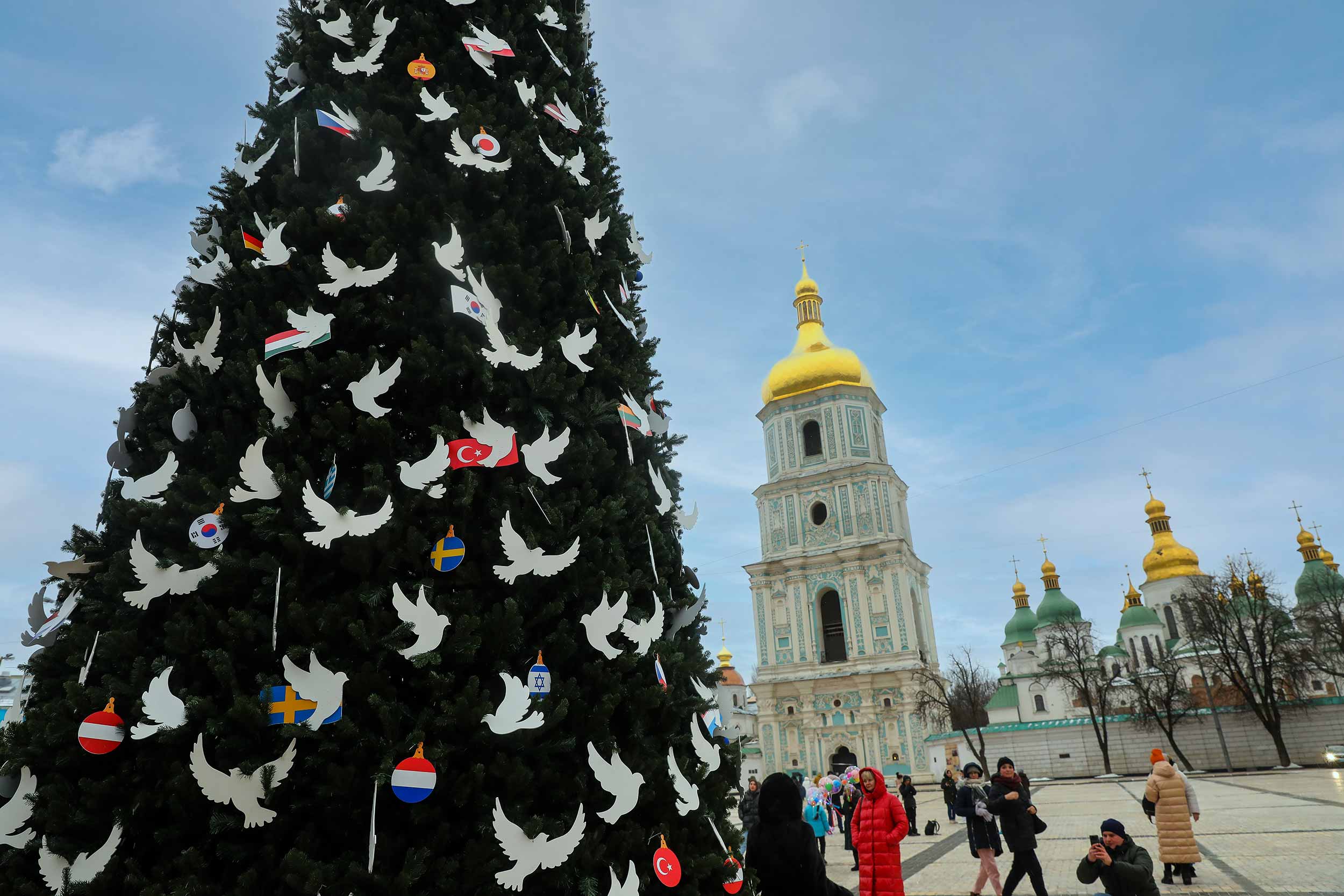Ukraine: “No One Can Steal Our Christmas Spirit”
Ukrainians remain defiant as they brace for what will be a tough holiday season.
Ukraine is one of five countries in the world that officially celebrates two Christmases – on December 25 and January 7, in line with the Gregorian and Julian calendars. Although the country is usually very festive at this time of year, this Christmas will be particularly poignant for Ukrainians – whether in the trenches, far from their families, displaced, lacking heat or light, or scattered abroad.
Yet many are determined to keep the Christmas spirit alive.
“The Christmas holiday is important for children, no matter the times we live in,” Iryna Breza, a journalist from the western Ukrainian town of Uzhhhorod, told IWPR. The annual parade of St Nicholas and the mykolaychiks, as Ukrainians call Santa’s little helpers, took place in darkness as black-outs continue due to Russian shelling of power plants. Crowds of people nonetheless joined the Transcarpathian Folk Choir in song, while banners read, “Welcome Saint Nicholas – Help Ukrainian Armed Forces.”
Breza’s husband is an ethnic Hungarian and their family traditionally celebrates both Christmas traditions, even before 2017 when Ukrainian president Petro Poroshenko signed the law declaring December 25 a public holiday. Pre-war, about nine per cent of the 42 million Ukrainians were Catholic or Protestant.
“On December 24, Christmas Eve, we visit my mother-in-law and father-in-law, the children decorate the Christmas tree the day before, pick candies in addition to toys, and receive gifts. In January, we mark Orthodox Christmas; we go to my mother's house, we eat traditional Ukrainian dishes, like kutya [a sweet grain pudding], and sing carols,” Breza explained.
Sitting at the confluence of four international borders, Zakarpattia is Ukraine’s most diverse region and Breza estimates that at least 30 per cent of the families mark Christmas in a similar way.
As the war continues to rage and families struggle with lack of electricity and heating, she remains determined to continue to mark Christmas.
“The lack of electricity and air sirens warning of shelling can get in the way, but even with candles, I'm sure it will be warm and cosy.”
Despite the difficulties, Uzhhorod, Ukraine’s westernmost town, is fairly sheltered; the situation gets more precarious as you move east. Security concerns have changed Christmas celebrations in Kharkiv, about 40 kilometres from the Russian border, which has been under continuous shelling since the full-scale invasion began in February.

The central Freedom Square will not have the traditional Christmas tree, light show and festive mini-village with wooden huts. The city council decided to move the festivities into the chandeliered Universitet metro station, which has been functioning as a bomb shelter for 11 months.
“I am sure that next year, after our victory, we will light the Christmas tree on Svobody Square," Igor Terekhov, the city mayor, stated on December 19, St Nicholas Day, as he inaugurated the tree.
Others, however, have postponed their celebrations. Before the war, Kharkhiv resident Yehor Horoshko and his family used to gather with relatives in a village in Sumy region.
“Christmas for us is always a family, traditional holiday, when the whole family gathers in one place, at one table,” the 46-year-old former IT professional told IWPR.
But Yehor has no festive plans this year. Since February 24 he has left his IT job and, together with his colleagues, created Hell's Kitchen, a volunteer organisation which has been feeding military personnel and civilians.
“War does not stop for celebration,” he said. “We continue to work because our work depends on whether the boys will have something to eat. We will celebrate everything after the victory.”
In the capital Kyiv, the majestic Santa Sofia Square by the homonymous 11 century cathedral hosts a Christmas tree, but a much dimmer one than usual. Russian attacks on critical infrastructure have plunged Ukraine into darkness as winter takes hold, so the tree is only illuminated at certain times.
There will be no food courts, Santa’s grotto or children’s rides. Instead, a tent welcomes residents who need to recharge their electronic devices.
People can buy Christmas trees near the metro stations, as well as vegetables and preserves. But survival has blunted the festive mood, as people focus on household chores in the limited hours when electricity is available.
Yurii Kravchenko, an engineer with the DTEK energy company, said that it would only be possible to fully restore the energy supply in Kyiv and the region after the war.
“Ukraine is in dire need of autotransformers and other critical equipment,” he said.
The city council building in Bucha, the small town in the outskirts of Kyiv which became infamous for the atrocities committed during the Russian occupation in March, has become a hub where people come to recharge devices, work on their computers and warm up.
Children congregate near the Christmas tree in the hall, playing with each other or on video games, as adults swap news, apply for subsidies and pay for utilities - even though some houses lack electricity and water for several days in a row.
Railway stations provide a ray of light. In Kyiv’s main station, the national railway company Ukrzaliznytsia erected a Christmas tree which can be illuminated by cycling on exercise bikes.
Ukrzaliznytsia, which has provided a lifeline to Ukrainians since the beginning of the war, partnered with UNICEF to come to the assistance of St Nicholas and provide a train carrying 30,000 gifts to children in Kharkiv, Donetsk, Mykolaiv and Kherson regions. The UN children’s fund also provided cash handouts for families in need: as of November 30, 2022, about 200,000 families in Ukraine had received a total of 191 million US dollars in assistance.
“Air defence works well but the sleigh still can’t fly,” Alexander Kamyshin, Ukrainian Railways’ CEO said, commenting on the Christmas train. “So the railway has become the official carrier of St Nicholas."
